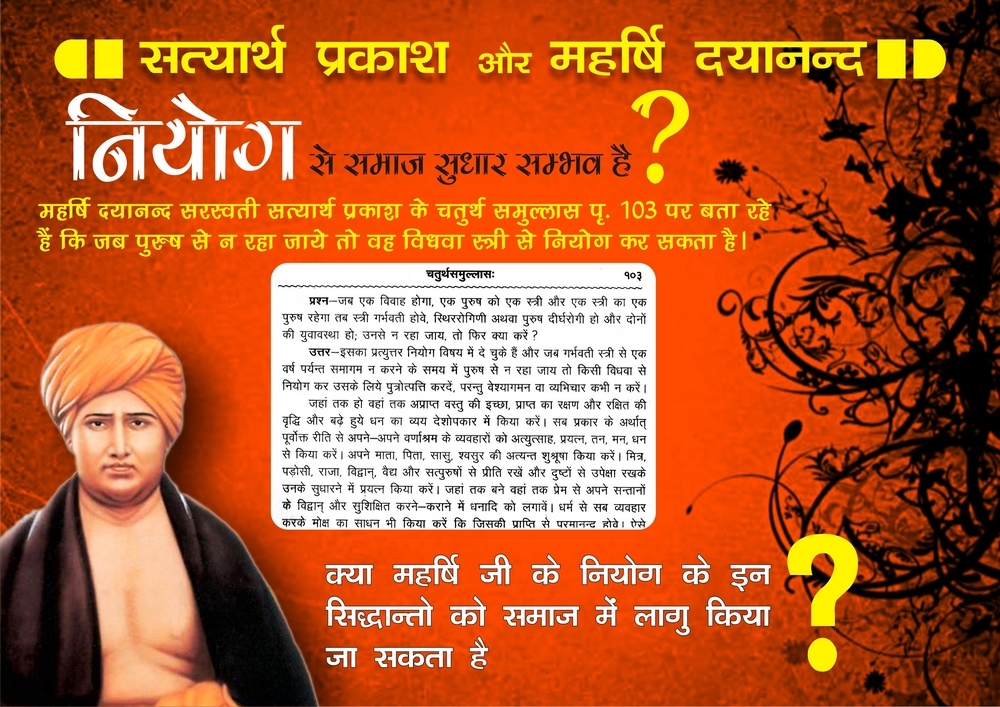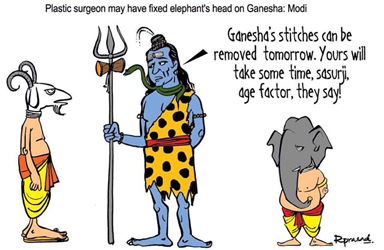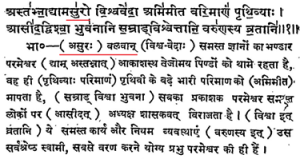The Vedas versus the Gita – Which is Right?
By Ibn Muhammad
The Bhagvad Gita and the Vedas are well known religious scriptures. Even within the large collection of Hindu texts, they stand out from others because they are considered to be the direct words of God, in contrast to to other Hindu scriptures which are known to be written by men. Common Hindus are made to believe that both these scriptures are inspired by the same God. The logical implication of such a belief is that there should not be any inconsistencies between them. However a thorough analysis of both these scriptures reveals that they contradict each other even in the most fundamental issues. Hence, both these scriptures cannot be said to be of the same religion.
At several places in the Vedas, emphasis is laid on desires and wishes. In many verses desires and wishes are expressed and prayers are made to fulfill the wishes. For example Yajurveda 40/2 mentions,
कुर्वन्नेवेह कर्माणि जिजीविषेच्छतँ समाः।
एवं त्वयि नान्यथेतोऽस्ति न कर्म लिप्यते नरे॥
One, only doing Karma here, should wish to live a hundred years. No way is there for you but this. So Karma cleaves not to man.
Yajurveda 40/16 says,
अग्ने नय सुपथा राये अस्मान्
By goodly path lead us to riches, Agni, you God who knows all our works and wisdom.
Atharvaved 14/2/38 says,
तां पूषञ्छिवतमामेरयस्व यस्यां बीजं मनुष्या वपन्ति
या न ऊरू उशती विक्षयाति यस्यामुशन्तः प्रहरेम शेपः
O Men, you are the strengthener. You inspire into this lady well-wisher of you and your family, the spirit of procreating children. The woman is such an entity in whom the men sow semen-seed, who desiring progeny spreads her thigh towards her husband, and in whom the husband like you and us thrust the organ with the desire of children. [Translation Acharya Vaidya Nath Shastri, Published by Sarvadeshik Arya Pratinidhi Sabha]
Atharvaveda 7/76/6 says,
धृषत पिब कलशे सोममिन्द्र वृत्रहा शूर समरे वसूनाम् |
माध्यन्दिने सवना आ वृषस्व रयिष्ठानो रयिमस्मासु धेहि ||
“O Indra; you are fearless bold and the destroyer of all obstacles coming in the war of wordly affairs. Please protect Soma, the soul who is residing in your pitcher, the body and shower upon us your blessings in all the time of noon when we perform Yajna. You are the master of all wealth and so grant us riches.” [Translation Acharya Vaidya Nath Shastri, Published by Sarvadeshik Arya Pratinidhi Sabha]
One can produce a long list of such mantras where material desires and wishes are expressed. However, the above will suffice for the moment.
In contrast to this the Gita denouces keeping desires and expressing them. It vehemently ridicules those who pray to God for fulfillment of desires. For example, Gita 2/47 says
मा कर्मफलहेतुर्भूः
“let not the fruits of action be your motive”
Gita 2/49 says,
दूरेण हय अवरं कर्म बुद्धियॊगाद धनंजय
बुद्धौ शरणम अन्विच्छ कृपणाः फलहेतवः
“O Dhananjaya, indeed, action is quite inferior to the yoga of wisdom. Take resort to wisdom. Those who thirst for rewards are pitiable.”
This denouces the Vedic prayers as pitiable.
Gita 3/19 says,
तस्माद असक्तः सततं कार्यं कर्म समाचर
असक्तॊ हय आचरन कर्म परम आप्नॊति पूरुषः
“Therefore without attachment, do you always perform action which should be done; for by performing action without attachment man reaches the Supreme.”
These blatant contradictions between the teachings of the Vedas and the Gita. One encourages works in order to seek rewards and the other talks of Nishkaama Karma or works without seeking rewards.
This, however, is not the end. The Gita goes ahead and denounces the Vedas openly by naming them as the source of the problem on this very subject. For example, Gita 2/42-44 says,
42 याम इमां पुष्पितां वाचं परवदन्त्य अविपश्चितः
वेदवादरताः पार्थ नान्यद अस्तीति वादिनः
43 कामात्मानः सवर्गपरा जन्मकर्मफलप्रदाम
करियाविशेषबहुलां भॊगैश्वर्यगतिं परति
44 भॊगैश्वर्यप्रसक्तानां तयापहृतचेतसाम
वयवसायात्मिका बुद्धिः समाधौ न विधीयते
“Men of small knowledge are very much attached to the flowery words of the Vedas, which recommend various fruitive activities for elevation to heavenly planets, resultant good birth, power, and so forth. Being desirous of sense gratification and opulent life, they say that there is nothing more. In the minds of those who are too attached to sense enjoyment and material opulence, and who are bewildered by such things, the resolute determination for devotional service to the Supreme Lord does not take place.”
As we can see, people who are attached to the FLOWERY WORDS of the Vedas are being ridiculed as अविपश्चितः or of low intellect. Futher Gita 2/45-46 says,
45 तरैगुण्यविषया वेदा निस्त्रैगुण्यॊ भवार्जुन
निर्द्वन्द्वॊ नित्यसत्त्वस्थॊ निर्यॊगक्षेम आत्मवान
46 यावान अर्थ उदपाने सर्वतः संप्लुतॊदके
तावान सर्वेषु वेदेषु बराह्मणस्य विजानतः
“The Vedas deal mainly with the subject of the three modes of material nature. O Arjuna, become transcendental to these three modes. Be free from all dualities and from all anxieties for gain and safety, and be established in the self. To the Brahmin who has known the Self, all the Vedas are of as much as is a reservoir of water in a place where there is a flood.”
Further, Gita 2/53 lays a more brutal attack on the Vedas in the following words,
श्रुतिविप्रतिपन्ना ते यदा सथास्यति निश्चला
समाधाव अचला बुद्धिस तदा यॊगम अवाप्स्यसि
“When your mind is no longer disturbed by the flowery language of the Vedas, and when it remains fixed in the trance of self-realization, then you will have attained the divine consciousness.”
The implication of the verse is that the FLOWERY LANGUAGE of the Vedas disturbs the mind of a person. Therefore intelligent people should avoid the Vedas.
Further the Gita reveals the inferiority of the teachings of the Vedas in the chapter 9 verses 20 and 21 as follows,
20 त्रैविद्या मां सॊमपाः पूतपापा; यज्ञैर इष्ट्वा सवर्गतिं परार्थयन्ते
ते पुण्यम आसाद्य सुरेन्द्रलॊकम; अश्नन्ति दिव्यान दिवि देवभॊगान
21 ते तं भुक्त्वा सवर्गलॊकं विशालं; कषीणे पुण्ये मर्त्यलॊकं विशन्ति
एवं तरयीधर्मम अनुप्रपन्ना; गतागतं कामकामा लभन्ते
“”Those who study the Vedas and drink the soma juice, seeking the heavenly planets, worship Me indirectly. Purified of sinful reactions, they take birth on the pious, heavenly planet of Indra, where they enjoy godly delights. When they have thus enjoyed vast heavenly sense pleasure and the results of their pious activities are exhausted, they return to this mortal planet again. Thus those who seek sense enjoyment by adhering to the principles of the three Vedas achieve only repeated birth and death.”
The clear implication is that Vedas are useless in achieving eternal salvation and Moksha i.e liberation from the cycles of death and birth, which is the ultimate aim of an individual, according to popular Hinduism.
Continuing the tirade against the Vedas, Krishna says in Gita 8/28
वेदेषु यज्ञेषु तपःसु चैव; दानेषु यत पुण्यफलं परदिष्टम
अत्येति तत सर्वम इदं विदित्वा; यॊगी परं सथानम उपैति चाद्यम
“A person who accepts the path of devotional service is not bereft of the results derived from studying the Vedas, performing austere sacrifices, giving charity or pursuing philosophical and fruitive activities. Simply by performing devotional service, he attains all these, and at the end he reaches the supreme eternal abode.”
The implication of the verse is that the knowledge of the Gita is superior to the knowledge of the Vedas.
The blunt critique of the Vedas continues when Krishna says in Gita 11/48,
न वेद यज्ञाध्ययनैर न दानैर; न च करियाभिर न तपॊभिर उग्रैः
एवंरूपः शक्य अहं नृलॊके; दरष्टुं तवदन्येन कुरुप्रवीर
“O best of the Kuru warriors, no one before you has ever seen this universal form of Mine, for neither by studying the Vedas, nor by performing sacrifices, nor by charity, nor by pious activities, nor by severe penances can I be seen in this form in the material world.”
Clearly, Krishna is claiming that the study of Vedas is useless in reaching God.
This type of critique of the Vedas is not even done by the Naastiks (atheists). Let me suggest an experiment to my readers. Try quoting the meaning of the above verses of Gita to a believer of Vedas and note his/her reaction. You should not be shocked if you hear some uncomfortable words or abuses. Then you can reavel to the Vedic believer that these tributes to the Vedas are actually given in the Gita. For example, tell a Hindu the following,
“God cannot be reached by the study of Vedas. Those people who are attached too much to the flowery words of the Vedas are fools and people of low intellect.”
Then see the reaction and ultimately reveal to them that these are not your words but the words of Shri Krishna in the Gita.
Another Inconsistency
Another inconsistency or call it a contradiction between the Vedas and the Gita is that according to Gita, God has been called as PURUSHOTTAM. Krishna says in Gita 15/18,
यस्मात कषरम अतीतॊ ऽहम अक्षराद अपि चॊत्तमः
अतॊ ऽसमि लॊके वेदे च परथितः पुरुषॊत्तमः
“Since I am transcendental to the mutable and above even the immutable, hence I am well known in the world and in the Vedas as the supreme person (PURUSHOTTAM).”
However, nowhere in the Vedas is God referred to as PURUSHOTTAM, the Supreme person. So either the Vedas are changed or the Gita is wrong.
More contradictions
Gita also opposess the conception of devatas (deities) of the Vedas. For example, Rigveda 7/49/4 mentions the following about Vaisvanara Agni
यासु राजा वरुणो यासु सोमो विश्वे देवा यासूर्जं मदन्ति |
वैश्वानरो यास्वग्निः परविष्टस्ता आपो ||
“They from whom Varuṇa the King, and Soma, and all the Deities drink strength and vigour, They into whom Vaiśvānara Agni entered, here let those Waters, Goddesses, protect Me.”
This mantra accepts the residence of Vaisvanara Agni in the waters (aapo). However, the Gita mentions the opposite about Vaisvanara Agni in Gita 15/14 as follows,
अहं वैश्वानरॊ भूत्वा पराणिनां देहम आश्रितः
पराणापानसमायुक्तः पचाम्य अन्नं चतुर्विधम
“Taking the form of Vaisvanara and residing in the bodies of creatures, I, in association with Prana and Apana, digest the four kinds of food”
Here Gita the residence of Vaisvanara Agni in the bodies of creatures and performing the function of digestion. This is contradicting with the words of the Vedas.
These are fundamental contradictions between the Gita and the Vedas. A logical Hindu cannot accept both scriptures simultaneously unless he becomes intellectually dishonest. One of these scriptures has to be rejected. This mission has been carried forward by a militant group called Arya Samaj. They understood these contradictions between both scriptures and tried many methods to discredit the Bhagvad Gita or bring it in compatibility with the Vedas. For example, Pandit Bhimsen Sharma, the disciple of Swami Dayanand Saraswati, brought these inconsistencies to the attention of the people. According to his logic, the God as depicted in the Vedas is formless but the God of Gita is with form; a certain man named Krishna, which is a contradiction. Hence, whatever shlokas in the Gita which he thought were contradicting with the Vedic conception of God, were taken out from the Gita by him. The numnber of shlokas, according to him, which are interpolated in the Gita are 238.
Another Arya Samajist, Swami Atmanand Saraswati has published a Gita called ‘VEDIC GITA‘ from Gurukul Jhajjar. In this version he has claimed that Bhagvad Gita is not completely correct. Many shlokas have been interpolated in it which are anti Vedic. Therefore, he took out all such shlokas which he thought were anti Vedic and published this PURE Vedic Gita. Even whole chapters liek chapter 7 and chapter 15 of Gita have been taken out by Swami Atmanand Saraswati.
Another scholar of Arya Samaj’s Sarvadeshik Arya Pratinidhi Sabha, Acharya Vaidhyanath Shastri writes in the preface of his book Gita Vivechan,
“There is no doubt that Gita rejects the Vedas and Vedic principles. It contains many teachings opposed to the Vedas. A book which compares divine Vedas to a small pit of water and claims that the Vedas teach nothing but three modes of material nature, how can we accept such a book?”
Now the choice is with the followers of Hinduism to take a decision in favour of either of these two scriptures because both cannot be accepted simutaneously without making necessary amendments.


